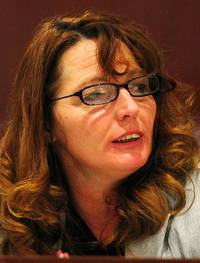Sun Coverage
A Nevada lawmaker told a group of business leaders Thursday that the state was making strides in its efforts to spur economic development and diversification.
Assemblywoman Marilyn Kirkpatrick, D-North Las Vegas, praised the adoption of Assembly Bill 449 in the 2011 Legislature and other efforts to boost the state’s economy.
The measure overhauls the state’s system of economic development by using $10 million from the Abandoned Property Trust Account to make grants and loans to regional development agencies that invested in businesses seeking to move to or expand in Nevada.
“It’s much different than what we’ve done in the past,” Kirkpatrick told members of NAIOP, the Commercial Real Estate Development Association, during its July breakfast meeting at the Orleans. “We have taken cracks at trying to change economic development in our state, but we never had a plan.”
Nevada has 11 economic development agencies and none was doing well, Kirkpatrick said. There hasn’t been a lot of accountability.
“This plan is good at encouraging people to work together as opposed to working apart,” Kirkpatrick said.
The newly created office of Economic Development will decide whether to grant partial property tax abatements for renewable energy facilities. The state will have help providing more direction in economic development dealing with renewable energy, technology, an inland port and workforce improvements, she said.
Nevada has had problems recruiting out-of-state companies because they don’t think it has the available workforce, said Kirkpatrick, who added it was vital to help existing businesses in the state as well.
The panel of lawmakers also featured state Sen. Michael Roberson, R-Las Vegas; State Sen. Joe Hardy, R-Boulder City; and Assemblyman Marcus Conklin, D-Las Vegas.
In a discussion about whether the state should have approved a two-year extension of $620 million in taxes approved in 2009 that were to expire, Roberson, said he believed taking $600 million out of the private-sector economy wasn’t the best option, but he holds no grudges over Republican Gov. Brian Sandoval for backing the plan to deal with a budget deficit that resulted from a ruling by the Nevada Supreme Court.
“He’s a great governor. I respect him, but he and I came out with a different position,” Roberson said.
Roberson said the good news for the business community is that the state averted the worse-case scenario proposal of as much as $1.5 billion in new tax revenue.
Conklin told business leaders that the extension of the taxes should have been on the table all along and that the governor did what was in the best interest of the state.
“It was the best option considering the circumstances,” Conklin said.
He said he doesn’t support a full-time Legislature or adding a lengthy session, but an alternative is needed for lawmakers to deal with problems that arise rather than wait every two years for a session.
Kirkpatrick said Nevada was one of the few states that hasn't changed its tax structure in a long time and lawmakers need to talk about that. She said she was not married to any solution and was willing to consider all options.
Hardy says it remains to be seen what effect the tax extension will have on the economy, which wasn’t hurt after a 2003 tax increase.
And whether mining should pay more in state taxes, Roberson says there’s not a lot to do while that industry has a protected status in the state's constitution.
Kirkpatrick said tax deductions for the industry, such as fire insurance, weren’t part of the constitution and should be looked at closely.
In a question about North Las Vegas, which she represents, Kirkpatrick said the city was violating state law because it didn’t have a balanced budget and she worried the city isn't able to get its fiscal house in order.
The state may take over the city’s financial management.
“Maybe they can do it in the short term, but long term I don’t know how they do it,” Kirkpatrick said of the city’s ability to deal with its problems and the hard choices that have to be made. “I think they are in trouble and have been in trouble for a long time.”
Kirkpatrick said North Las Vegas business and property owners face high enough fees and taxes and she fears additional taxes to deal with the problem. That would make businesses reluctant to move to North Las Vegas, she said.
